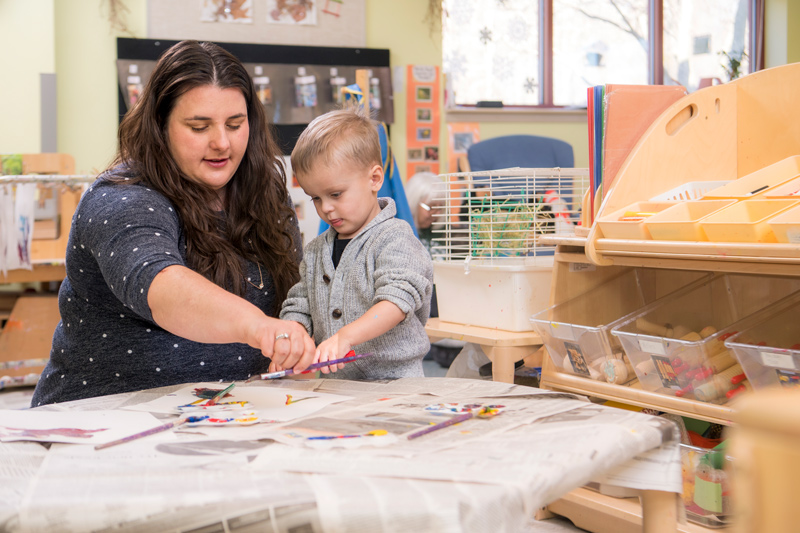Unsettled science on the long-term impact of early education

A new article by UD assistant professor finds mixed evidence on the long-term effectiveness of preschool
Early childhood education programs can help young children develop foundational academic and social-emotional skills, especially for children in underserved communities. However, a new article published by University of Delaware Assistant Professor Anamarie Whitaker and her co-authors argues that the science on the long-term effects of early childhood education is unsettled.
In a new review published in Science, Whitaker and her co-authors at the University of Virginia, the University of California, Irvine and Teachers College, Columbia University find mixed evidence on the long-term effectiveness of today’s preschool programs. The article reviews four rigorous evaluations of publicly funded preschool programs, which report a mix of positive, negative and no differences in the school performance of children who did and did not attend preschool programs in elementary school and beyond. The findings challenge long-held beliefs about the universal long-term benefits of preschool programs, but the authors argue that additional research is needed.
“Many families rely on preschool programs to provide care while parents work,” said Whitaker, who specializes in early childhood education policy in UD’s College of Education and Human Development. “So, we need to understand how to ensure programs provide children with the best foundation possible to support their development.”
Unsettled science on the effects of early education
Public beliefs about preschool are heavily influenced by two well-recognized evaluations of the Perry Preschool and Abecedarian programs, which occurred in the 1960s and 1970s. Results from the studies indicate beneficial impacts extending well into adulthood. Children that attended those programs, on average, experienced higher levels of educational attainment, employment, income and health, as well as lower levels of crime.
Recent high-quality preschool evaluations also find positive impacts on educational outcomes. For example, Whitaker and her team reviewed an evaluation of Boston’s public pre-k program with cohorts of children that entered the program between 1997 and 2003. This program resulted in improved high school graduation and college attendance and reduced disciplinary problems in high school.
But other high-quality evaluations provide contradictory evidence about whether these programs improve long-term success in school and beyond. For example, an evaluation of the Tennessee Voluntary Pre-K program (TNVPK) negatively impacted academic and behavioral outcomes in elementary school. At the end of their program year, children attending the program outscored their comparison-group counterparts on literacy, language and math assessments. But by sixth grade, children that attended TNVPK scored lower on math and reading tests than their non-TNVPK peers.
Two other evaluations—a large-scale evaluation of the Head Start program and an evaluation of a later cohort attending the Boston program—reported no differences on academic achievement outcomes across elementary school between preschool participants and non-participants.
“Preschool programs have long been hailed as effective interventions, yet our study reveals a more nuanced reality,” says senior author of the study Margaret Burchinal, research professor in the Center for Advanced Study of Teaching and Learning at the University of Virginia. “While many presume their positive impact, rigorous evaluations show a mix of outcomes, including both successes and setbacks and, in some cases, no discernible long-term effects. It’s imperative that we design preschool programs to uniformly promote school success, especially for children from families with low income.”
In a working paper published in December 2023, Whitaker and other co-authors begin to explore why preschool programs may be becoming less effective. In that paper, Whitaker and her team focus on changes in instructional practices and increases in social supports for children who do not attend preschool as potential explanations for why preschool program effects differ from the results of earlier programs like Perry and Abecedarian.
Recommendations for further research
The authors stress that the evidence does not support dismantling existing preschool programs—care is essential for working families with young children, especially low-income families.
From a policy perspective, they specifically recommend that the funding agencies for public preschool programs require lottery-based evaluations of oversubscribed classrooms. These evaluations should measure a wider variety of classroom practices and follow children in elementary school through high school and ideally into adulthood.
Second, they recommend that researchers conduct longer-run follow-ups of existing lottery-based studies of preschool programs to see if they provide benefits in adulthood.
“We need additional research to understand how best to make preschool programs effective for children in the short- and long-term,” Whitaker said. “Specifically, we need to learn more about what practices within preschool programs can best promote children’s positive development into kindergarten and throughout their educational career.”
To learn more about CEHD research in education and social policy, visit its research page.
Article by Jessica Henderson. Photography by Kathy F. Atkinson.



